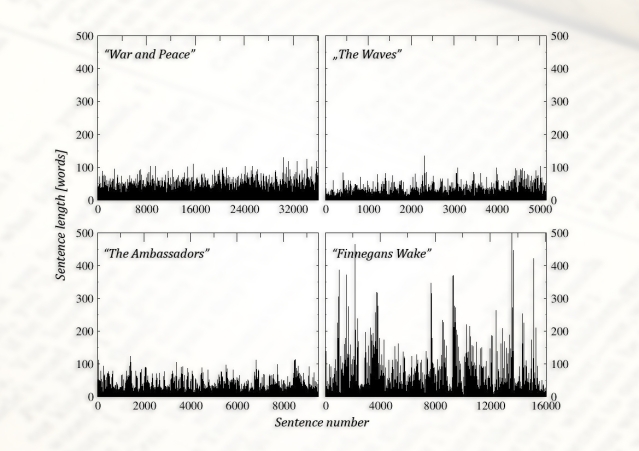Joyce, Wallace, Woolf and More Wrote in Fractals

For writers who never did well in math, you might be surprised to learn that literature contains fractals.
Fractals are geometric figures made of small components that have statistical characteristics identical to the whole. If you zoom in on a fractal, you see the same shapes again and again no matter how far you zoom in.
In the world of math, fractals are used to analyze and describe snowflakes, crystal growth, galaxies and coastlines.
It seems they can describe language as well.
Researchers from the Institute of Nuclear Physics of the Polish Academy of Sciences completed a statistical analysis of 100 works of literature written in several languages and representing various genres. Authors included Dickens, Dumas, Mann, Eco, Joyce, Woolf, Beckett and more.
The researchers chose written works that had at least 5,000 sentences and then examined the sentence lengths and how they varied.
Here’s an example of four.

They found that in a majority of the texts, the sentences had a structure that resembled the whole of the written work.
As the Guardian puts it, “the correlations in variations of sentence length were governed by the dynamics of a cascade – meaning that their construction is a fractal.”
Certain works, particularly those written in the stream-of-consciousness style, were even more complex and could be compared to multifractals.
Finnegans Wake by James Joyce had the most complex structure of all.
“The results of our analysis of [Finnegans Wake] are virtually indistinguishable from ideal, purely mathematical multifractals,” said professor Stanisław Drożdż.
While poking around for details for this blog, I came across an interesting quote from David Foster Wallace about Infinite Jest during an interview with Michael Pietsche, editor at the time of Little, Brown:
“That’s one of the things, structurally, that’s going on [in the novel]. It’s actually structured like something called a Sierpinski Gasket, which is a very primitive kind of pyramidical fractal, although what was structured as a Sierpinski Gasket was the first — was the draft that I delivered to Michael in ’94, and it went through some I think ‘mercy cuts’, so it’s probably kind of a lopsided Sierpinski Gasket now. But it’s interesting, that’s one of the structural ways that it’s supposed to kind of come together.”
Other works in the study considered multifractal included A Heartbreaking Work of Staggering Genius by Dave Eggers, Rayuela by Julio Cortazar, The US Trilogy by John Dos Passos, The Waves by Virginia Woolf, 2666 by Roberto Bolano, and Joyce’s Ulysses.
Drożdż and his team think that perhaps the pattern comes from an intuition written in our DNA. “Nature evolves through cascades and thus arranges fractally, and imprints of this we find in the sentence-length variability.”
A sentence is a novel is a person is a solar system is a universe.
Credit: Kent Schimke / Flickr Creative Common